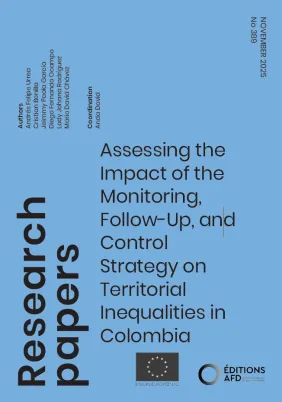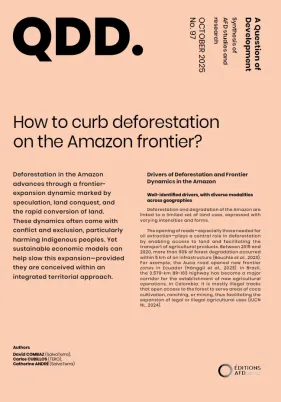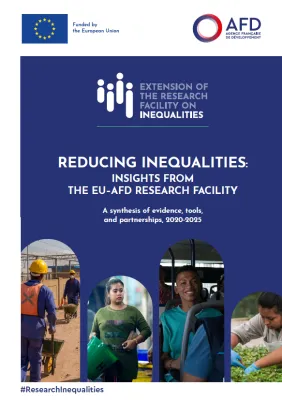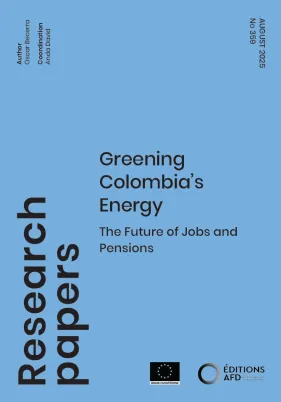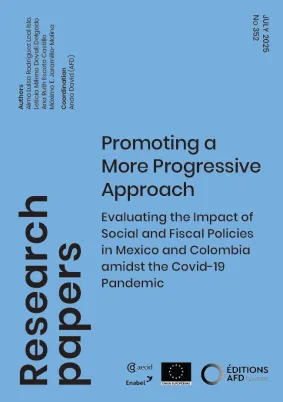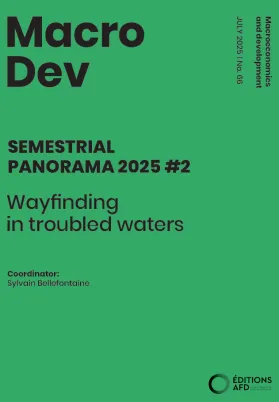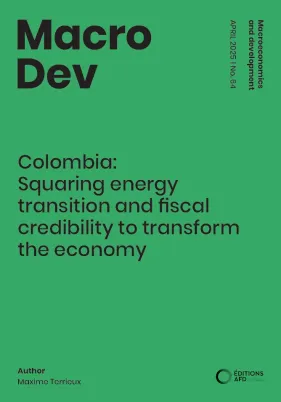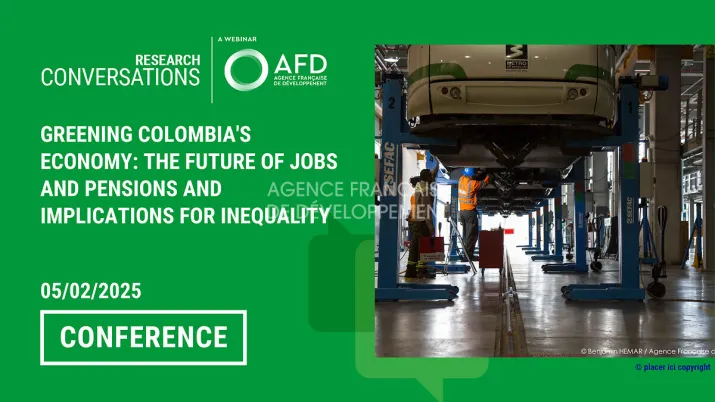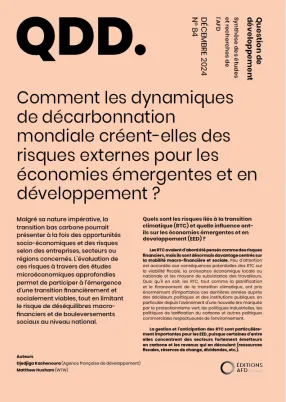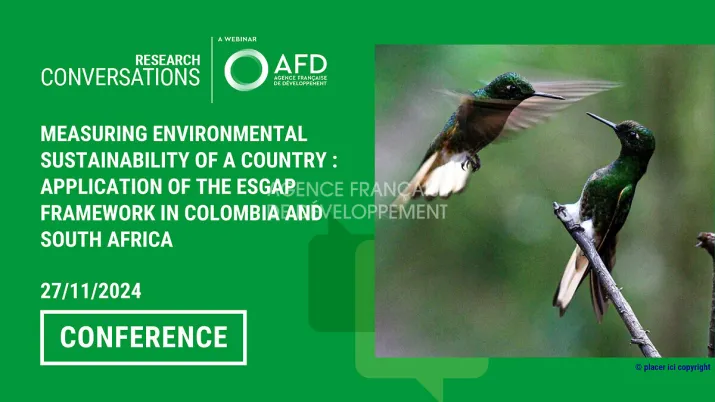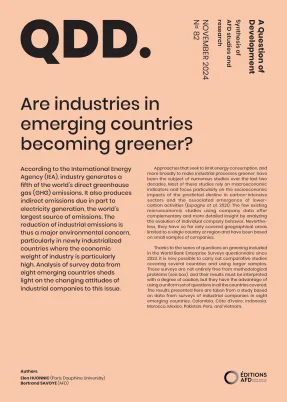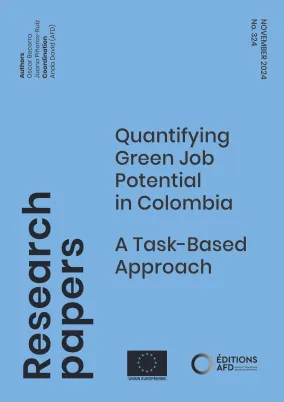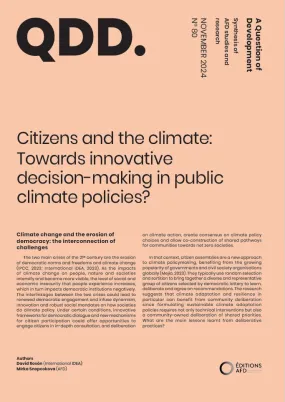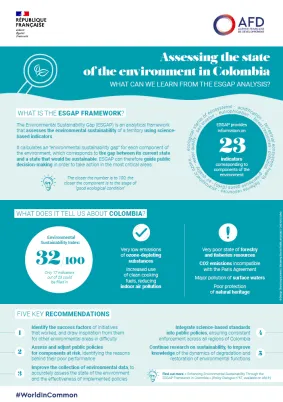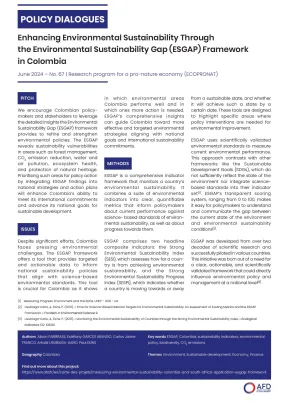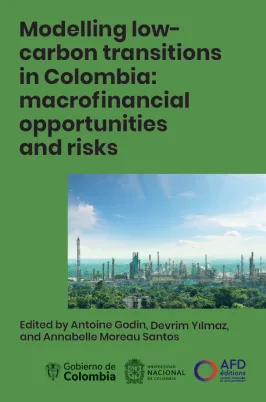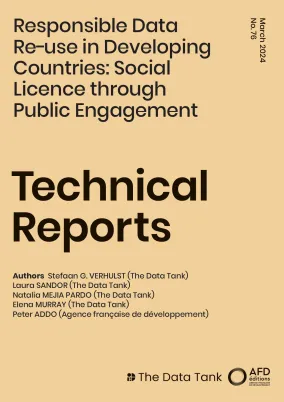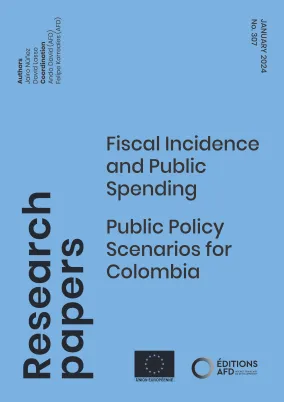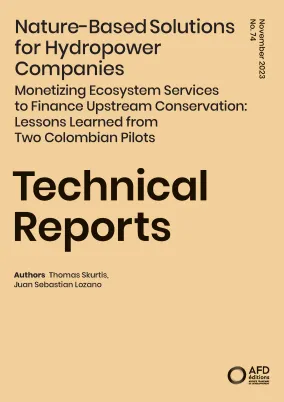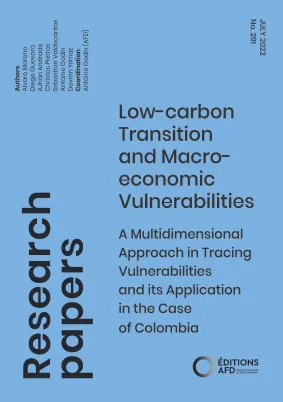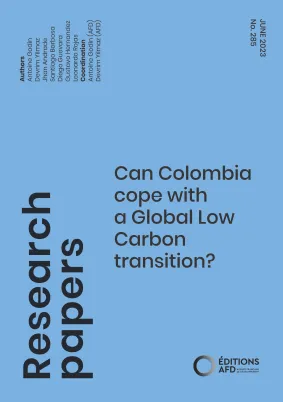Publications and media
Assessing the Impact of the Monitoring, Follow-Up, and Control Strategy on Territorial Inequalities in Colombi...
This article analyzes the Monitoring, Tracking, and Control Strategy (EMSC) of Colombia's General System of Participations (SGP) as an instrument for reducing territorial gaps in key sectors such as e...
How to curb deforestation on the Amazon frontier?
Deforestation in the Amazon advances through a frontierexpansion dynamic marked by speculation, land conquest, and the rapid conversion of land. These dynamics often come with conflict and exclusion,...
Published on
Reducing Inequalities: Insights from the EU-AFD Research Facility
In this summary, find more information about the lessons learned, tools, and partnerships developed within the framework of the EU-AFD Facility for Research on Inequalities between 2020 and 2025.
Published on
Greening Colombia’s Energy: The Future of Jobs and Pensions
This paper evaluates the effects of Colombia's transition to a low-carbon economy on employment and pensions. Utilizing a three-stage analysis integrating national energy scenarios, an input-output mo...
Promoting a More Progressive Approach - Evaluating the Impact of Social and Fiscal Policies in Mexico and Colo...
This research paper analyzes the redistributive impact of some fiscal policies and social programmes (direct taxes and transfers) before and after the pandemic Crisis in Mexico and Colombia, following...
Semestrial panorama 2025#2 - Wayfinding in troubled waters
By their scale and volatility, and even if their application has been temporarily limited, the Trump administration's announcements have begun to destabilize the global economy. Indeed, in addition to...
Colombia: Squaring energy transition and fiscal credibility to transform the economy
Despite a robust institutional framework and a broadly sound policy mix, Colombia’s economic model is running out of steam. For over a decade, since the end of the commodities supercycle,growth has be...
Published on
Research Conversations replay: Greening Colombia's Economy: The Future of Jobs and Pensions and Implications f...
This webinar is part of the conference series 'Research Conversations'.
Published on
How do global decarbonization trends create external risks for emerging and developing economies?
The low-carbon transition, despite its imperative nature, is likely to present both economic and social opportunities as well as downside risks, depending on the companies, sectors, or regions. The as...
Published on
Research Conversations replay: Measuring environmental sustainability of a country : application of the ESGAP ...
This webinar is part of the conference series 'Research Conversations'.
Published on
Are industries in emerging countries becoming greener?
According to the International Energy Agency (IEA), industry generates a fifth of the world’s direct greenhouse gas (GHG) emissions. It also produces indirect emissions due in part to electricity gene...
Published on
Quantifying Green Job Potential in Colombia: A Task-Based Approach
This paper examines the impact of the green transition on the Colombian labor market. Using a task-based approach and data from the 2022 Colombian Household Survey, we find that approximately 22.6% of...
Published on
Citizens and the climate: Towards innovative decision-making in public climate policies?
This publication is a synthesis of a study by International IDEA: “Deliberative Democracy and Climate Change; Exploring the Potential of Climate Assemblies in the Global South”. The two main crises of...
Published on
Assessing the state of the environment in Colombia: What can we learn from the ESGAP analysis
As part of the ECOPRONAT research programme, AFD supports the development of methodologies for assessing environmental sustainability on a territorial scale using the ESGAP (Environmental Sustainabili...
Published on
Enhancing Environmental Sustainability Through the Environmental Sustainability Gap (ESGAP) Framework in Colom...
We encourage Colombian policymakers and stakeholders to leverage the detailed insights the Environmental Sustainability Gap (ESGAP) framework provides to refine and strengthen environmental policies....
Published on
Modelling low-carbon transitions in Colombia: macrofinancial opportunities and risks
With over fifty percent of its total exports consisting of petroleum and coal, Colombia remains highly vulnerable to both global and domestic energy transitions. With the aim of fostering policy dialo...
Published on
Responsible Data Re-use in Developing Countries: Social Licence through Public Engagement
The datafication era has transformed the technological landscape, digitizing multiple areas of human life and offering opportunities for societal progress through the re-use of digital data. Developin...
Published on
Fiscal Incidence and Public Spending: Public Policy Scenarios for Colombia
In 2020, Colombia recorded the highest levels of inequality and poverty in the last decade. According to the National Administrative Department of Statistics (DANE, 2020), the monetary poverty rate re...
Published on
Nature-Based Solutions for Hydropower Companies
While forest ecosystems provide invaluable services to water users, conservation efforts have fallen short of needs. Spending on nature is negligible compared to the $800bn invested annually by the wa...
Published on
Low-carbon Transition and Macroeconomic Vulnerabilities: A Multidimensional Approach in Tracing Vulnerabilitie...
The transition to a low-carbon and climate resilient economy is a process of heavy restructuring of the productive network, during which sunset industries are in decline or even disappear, while sunri...
Published on
Can Colombia cope with a Global Low Carbon transition?
This paper aims to understand the long-term consequences for the Colombian economy of a global low-carbon transition. The paper proposes an empirical Stock-Flow Consistent model for Colombia, encompas...
Published on

